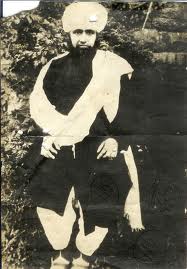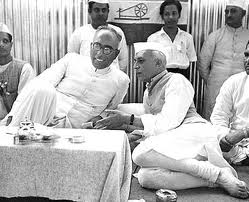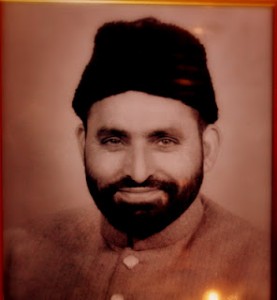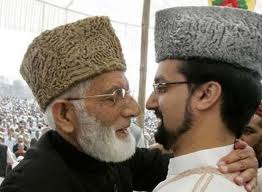Peace Watch » Editor's Take » A Word With Kashmir Leaders
A Word With Kashmir Leaders
 Some hard thinking is required. Each one of us has to do it. In fact, every one owes it. I owe it as a kibitz columnist and leaders owe it as men who lead and shape the destiny of people.
Some hard thinking is required. Each one of us has to do it. In fact, every one owes it. I owe it as a kibitz columnist and leaders owe it as men who lead and shape the destiny of people.
Sitting in one-day seminar organized by the Kashmir Bar Association on Tuesday on the subject, “Kashmir Freedom Struggle in the Current Global Political Scenario and Prospects of A Solution” and listening to learned speakers, I started pondering: Where have we erred during the past sixty four years? Are we as the people responsible for the perpetuation of the uncertainties that have been consuming us within like some deadly diseases? Have leaders failed us? Are we paying for their amateurish approach, failing to rise to the occasions, and taking right decisions at the right moment? If investing in one leader and one party has done wrong after wrong to us and led us from a murky pond into marshy one. Alternatively, was the idea of collective leadership and the ‘forum politics’ right answers for correcting the past mistakes? Has the collective leadership proved counter-productive and for their working at cross-purposes at important junctures defeated the very purpose for which people offered innumerable sacrifices. Has forum politics a class of political parasites that have been fattening at the sufferings of the common people.
The big question is if the mistakes committed in the past are not being repeated and repeated dauntlessly.
My trepidations sharpened as I heard speaker after speaker filling the air with despair, disappointment and nothing but pessimism. Some speakers called for incremental approach instead of the holistic one that has been the refrain of a larger section of the lawyers’ fraternity for past many years. Some streaks of hope were discernable in the speech of a law teacher from the University of Kashmir. His optimism emanated from the changed geo-strategic scenario in the region. It would be too early to comment on the post 2014 scenario when USA is expected to completely withdraw its troops from Afghanistan. The emerging scenario that indicates tilting of power balance in the region with Iran, Pakistan and Afghanistan likely entering into a strategic partnership has a couple of caveats like, if China joins such a strategic partnership. Moreover, if subservience of Iran and India relations to that of the India-US- Israel strategic partnership increases as the date for withdrawal approaches. It is a wait and watch situation- in this wait and watch where does Kashmir stand is the question. In this wait and watch situation if Kashmir leadership is not again caught on a wrong foot that will lead into yet another cul-de-sac.
 Caught up in the web of questions, believing that history is the best guide, I started filliping through the pages of history. That opened up like a bible revealing causes of our predicaments and their perpetuation.
Caught up in the web of questions, believing that history is the best guide, I started filliping through the pages of history. That opened up like a bible revealing causes of our predicaments and their perpetuation.
Six decades narrative of this land is tormented with leadership working at cross purposes at the cross roads of our history. It in fact has been this working at the cross-purposes at the critical junctures that I see as one of the main contributory factors to the messy situation that Kashmir is caught up in. And that has steered us from one uncertainty to another, and continues to do so even to this day. To illustrate my point of view let me cull out a few glaring incidents from the pages of our history that I believe have contributed to the birth and continuation of Kashmir agonies:
- Barely one year after its birth in 1932, the Jammu and Kashmir Muslim Conference got divide more out of the machinations of Maharaja Hari Singh, than any inherent contradictions in the movement for ending feudal rule. The rule that was discriminatory to the overwhelming Muslim majority of the state. Had the then leadership heeded to the advice of Allama Muhammad Iqbal and ended their differences the fifth columnists like Bazaz would not have succeeded in misdirecting the movement. This division snowballed into a disastrous situation that caused leaders working for cross-purposes at all important cross roads. Including the 1947 happenings that historian Alistair Lamb sees as “birth of a tragedy”. Moreover, what happened later could be best described as the after effects of an earthquake.

- In 1964, after the Holy Relic Movement the goal was not only distinctly visible but just a step away. Had the then leadership set a higher goal than settling scores with 1953 bête noire and allowing the ‘hidden hands’ a greater space to operate for inducting their trusted into corridors of power for eroding the Article 370 further in exchange release of some leaders perhaps this impasse would not have been there at all. It was this maturely amateurish handling of the movement, which revived old political feuds and added yet another ugly chapter to our history, thus distanced the goal further.
- In the post 1971 and 1972 situation, the Kashmir leadership not only failed to grapple with the new situation but also was terrifyingly afflicted with ‘hamlet syndrome’ that entrapped it into a bargaining game for entering into the corridors of power. Had not Syed Mir Qasim the then Chief Minister succeeded in winning over two of the three organizations demanding and made them to agree to partake in elections to exhaust the bargaining power of the Plebiscite Front that had boycotted the 1972 elections, perhaps the Front would have never become bold enough to enter into an agreement with New Delhi in 1975.
- The Indira-Sheikh Accord would have ab initio crumbled had not the wind been taken out of the sails of pro-right to self determination organizations by not arriving at an arrangement with them during 1972 elections. Intriguingly, these organizations endorsed the 1975 accord by jumping on to the Janata bandwagon directly and indirectly and allowing the National Conference an unprecedented victory at the hustings. This was good as writing an epitaph on the movement for bringing permanent peace in the region.

These are few illustrations, the post 1977 history is replete with instances that suggest, those sitting in the cockpits have at many a critical junctures by working at cross-purposes defeated the movements that held promise of ending uncertainties in the state. Many a time, history offered opportunities to men in cockpits to steer out of whirlwinds but for their unskilled approach blustered with egocentricity they failed the opportunities were lost.
History has brought us at yet another critical juncture and if leadership at this time also works at cross-purposes and does not understand nuances of the emerging scenario in the sub-continent vis-à-vis Kashmir it would be writing yet another tragic chapter in the history of the land… Introspection is need of the hour.
Filed under: Editor's Take · Tags: Abdullah, Kashmir, Mirwaiz, Pakistan, Syed Ali Geelani, Z. G. muhammad, Zahid G Muhmmad








Kashmir’s problem can not be solved unless all Kashmiree leaders speak in one voice for settling the regions political future.All of them appropriate separatist attitude for sustaining their politics.The Indian establishment knows this behaviour of Kashmiri politicians so well that there is no breakdown of correspondence between the pro-Indian and Anti Indian voices.This not a new tendency.After all King Jaluka of felt proud in calling himself the son Of Emperor Ashoka.Except brief interval of Zain-ul Abidin the Sultanate was dominated by civil war till ultimately we subjected Kashmir to Mughals.In this process the Kashmiri political elite always played significant role.Same chapter was repeated in facilitating Afghan,Sikh and Dogra rule.From 1947 we are all witness to what is happening.Each time it is common people who are victims of these atrocities and uncertainties.Ithink a local Kashmiri poet has summed it up nicely when he says: chai na khahish pan kinnas cham khabar–
vakhat ken sodagaran van kya karakh
so unless these sodagars are not stoped to sell Kashmir can not come out of this turmoil.